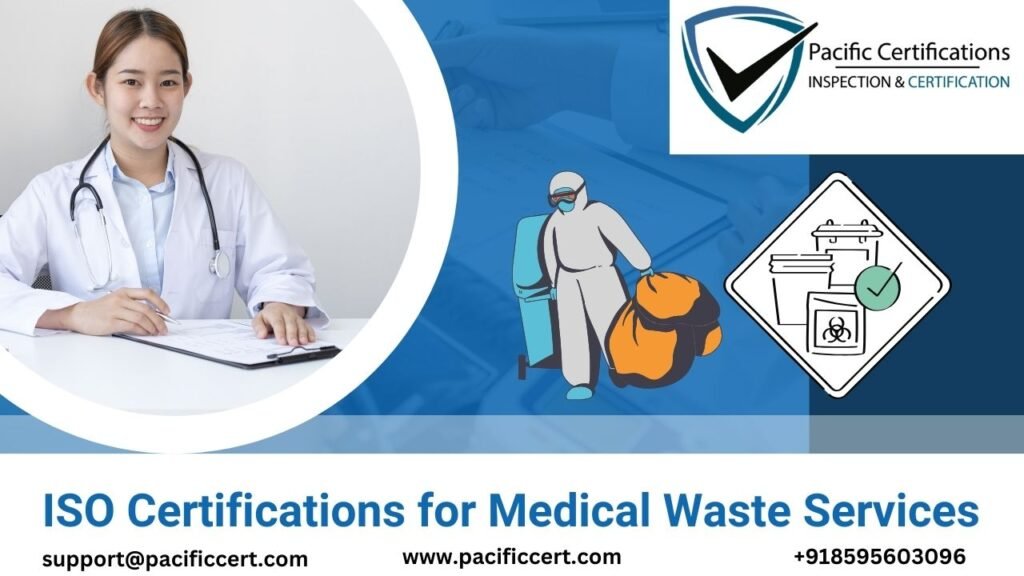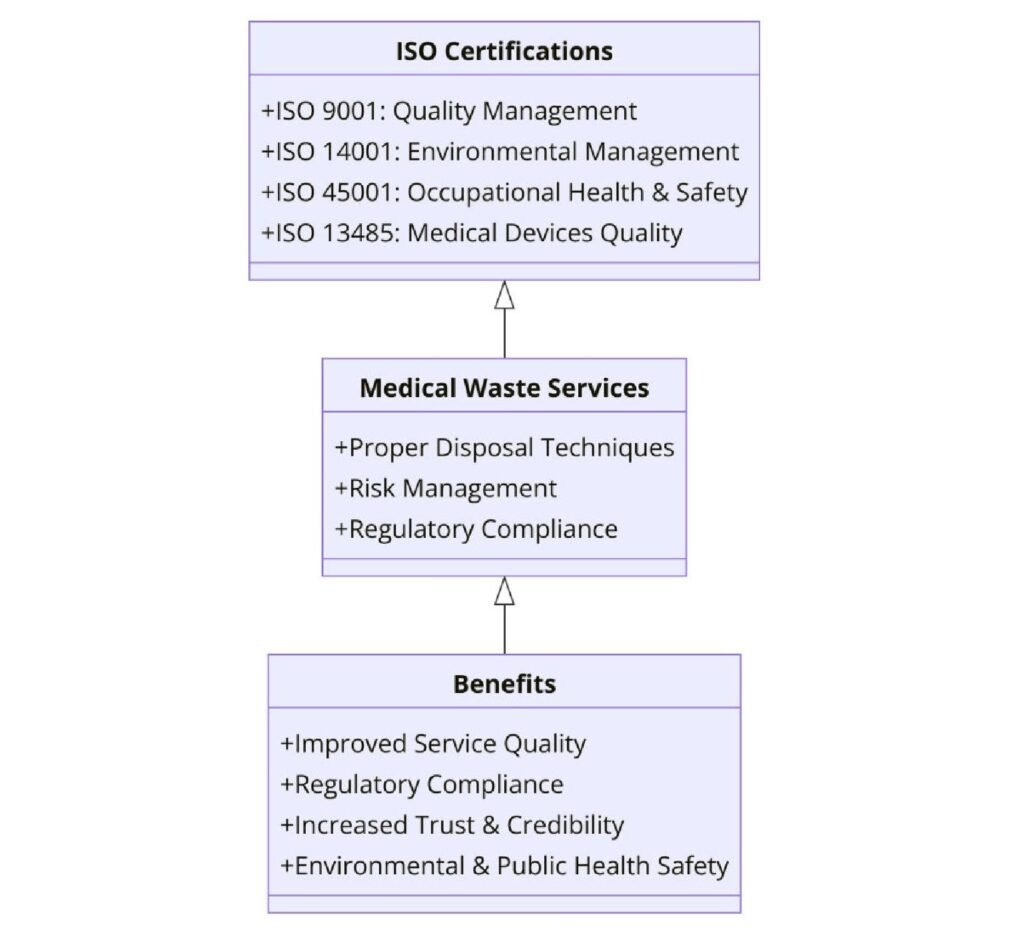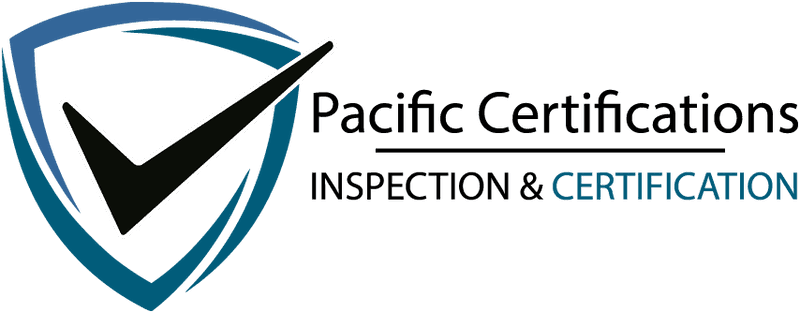
ISO Certifications for Medical Waste Services, Requirements and Benefits
Medical waste management is a crucial aspect of healthcare and environmental safety. Hospitals, clinics, laboratories & other healthcare facilities generate substantial amounts of waste, including sharps, infectious materials, pharmaceutical residues and hazardous chemicals. If not managed properly, medical waste can pose significant health and environmental risks.
ISO provides globally recognized standards that ensure the proper handling, transportation, treatment, and disposal of medical waste. Implementing ISO standards helps medical waste service providers improve efficiency and improve sustainability.

Looking for ISO certification for your medical waste services? Get certified with Pacific Certifications today! Email us at support@pacificcert.com or call us at +91-8595603096.
Applicable ISO Standards for Medical Waste Services
Several ISO standards apply to medical waste management, covering quality, safety, environmental impact, and risk management. Here are the most relevant certifications:
ISO 9001:2015 – Quality Management System (QMS): ISO 9001 ensures that medical waste service providers maintain a structured quality management system. It helps organizations deliver consistent, high-quality services, improve customer satisfaction, and enhance operational efficiency.
Key Areas of Compliance:
- Standardized procedures for waste collection, transportation, and disposal
- Continuous improvement through monitoring and audits
- Employee training and competence development
- Customer satisfaction and feedback management
ISO 14001:2015 – Environmental Management System (EMS): ISO 14001 focuses on minimizing the environmental impact of medical waste disposal. Waste management companies must ensure that their operations do not contribute to pollution and that they follow sustainable waste treatment practices.
Key Areas of Compliance:
- Environmental impact assessment of waste treatment processes
- Compliance with local and international environmental regulations
- Efficient use of resources and waste reduction strategies
- Emergency preparedness for hazardous waste incidents
ISO 45001:2018 – Occupational Health and Safety Management System (OHSMS): Medical waste services involve handling hazardous materials, which pose risks to workers. ISO 45001 ensures workplace safety by implementing preventive measures and fostering a health-conscious work environment.
Key Areas of Compliance:
- Risk assessments for hazardous waste handling
- Implementation of safety training programs
- Personal protective equipment (PPE) compliance
- Emergency response planning for exposure incidents
ISO 13485:2016 – Medical Devices Quality Management System: While primarily for medical device manufacturers, ISO 13485 is relevant for waste management services that handle expired, defective, or contaminated medical devices. Compliance ensures safe disposal and proper documentation.
Key Areas of Compliance:
- Traceability of medical device disposal
- Safe handling and destruction processes
- Documentation and record-keeping of disposed devices
ISO 31000:2018 – Risk Management: This standard provides a framework for identifying and mitigating risks associated with medical waste collection, transportation, and disposal.
Key Areas of Compliance:
- Risk assessment methodologies for waste services
- Crisis management and emergency response planning
- Legal and regulatory risk assessment
Click here to find out more applicable standards to your industry
At Pacific Certifications, we specialize in auditing and issuing ISO certifications for medical waste service providers. Our team ensures that your organization meets the necessary compliance standards through a thorough and transparent certification process.
We do not offer consultancy, training, or implementation services, but we provide impartial and independent certification that demonstrates your compliance with international ISO standards. Our certification adds credibility to your organization, helping you gain trust from regulatory authorities, clients, and stakeholders.
Stand out in the medical waste industry with globally recognized ISO certification. Get started today! support@pacificcert.com | +91-8595603096.
Requirements of ISO Certifications for Medical Waste Services
Each ISO certification has specific requirements that organizations must fulfill. Here’s a breakdown of the core requirements:

ISO 9001:2015 – Quality Management System (QMS)
- Establish a quality policy and objectives.
- Implement documented procedures for medical waste handling.
- Conduct regular internal audits to ensure process effectiveness.
- Implement a customer feedback and complaint resolution system.
- Ensure continuous improvement through performance monitoring.
ISO 14001:2015 – Environmental Management System (EMS)
- Conduct an environmental impact assessment for medical waste disposal.
- Establish policies for waste reduction, recycling, and pollution control.
- Monitor and comply with environmental regulations.
- Implement emergency response plans for hazardous waste incidents.
- Set up a continuous improvement system for environmental performance.
ISO 45001:2018 – Occupational Health and Safety Management System (OHSMS)
- Conduct a risk assessment for employee exposure to hazardous waste.
- Develop and implement safety procedures and personal protective equipment (PPE) requirements.
- Provide employee safety training on handling medical waste.
- Establish incident reporting and emergency response plans.
- Monitor workplace health and safety performance regularly.
ISO 13485:2016 – Medical Devices Quality Management System
- Ensure safe collection and disposal of expired, defective, or contaminated medical devices.
- Maintain traceability records of all disposed medical devices.
- Follow regulated sterilization and disposal procedures.
- Implement documentation and reporting of medical device disposal activities.
ISO 31000:2018 – Risk Management
- Identify and assess potential risks in medical waste handling.
- Implement preventive and corrective actions to mitigate risks.
- Establish a risk-based decision-making framework.
- Ensure compliance with legal and regulatory risk requirements.
- Continuously monitor and update risk management policies.
Each of these standards plays a vital role in ensuring safe, compliant and efficient medical waste management practices.
For ISO certification audits and issuance, contact Pacific Certifications at support@pacificcert.com!
Benefits of ISO Certifications for Medical Waste Services
Achieving ISO certification offers numerous advantages to medical waste service providers:

Regulatory Compliance: ISO certification ensures that your organization adheres to international and local waste management regulations, reducing the risk of penalties or legal issues.
Environmental Sustainability: By following ISO 14001, companies can minimize their environmental footprint through better waste disposal techniques and sustainable practices.
Safety & Risk Management: ISO 45001 helps in creating a safer work environment, reducing the likelihood of workplace accidents, and ensuring compliance with occupational health regulations.
Reputation & Credibility: ISO-certified organizations gain the trust of healthcare facilities, regulatory bodies, and the public, enhancing their business reputation.
Efficiency & Cost Reduction: Standardized procedures under ISO 9001 streamline operations, reduce inefficiencies, and lower waste management costs.
Market Competitiveness & Business Growth: Certification can give businesses a competitive edge in tenders, contracts, and partnerships with healthcare institutions seeking reliable waste disposal services.
The medical waste industry is evolving, with new trends emerging in this year. According to recent market research, the global medical waste management market is expected to reach $17.1 billion by 2028, driven by rising healthcare waste, stricter regulations and technological advancements in waste treatment.
Key trends include:
- Automation & AI in Waste Sorting – Technologies like robotic waste segregation and AI-powered tracking are improving efficiency.
- Sustainable Waste Disposal Solutions – Innovations such as biodegradable packaging and eco-friendly incineration methods are on the rise.
- Stronger Regulations – Governments worldwide are tightening medical waste disposal regulations, making ISO certification more essential than ever.
If your organization handles medical waste and wants to ensure compliance with international standards, obtaining ISO certification is a crucial step. Pacific Certifications can help you achieve globally recognized certification and environmental responsibility.
Pacific Certifications is accredited by ABIS, in case you need support with ISO certification for your Medical Waste Services business, please contact us at support@pacificcert.com or +91-8595603096.
FAQs: ISO Certifications for Medical Waste Services
ISO certification ensures compliance with legal requirements, enhances operational efficiency, and improves environmental and workplace safety.
The certification timeline varies based on the organization’s size and preparedness. Typically, it takes 2-6 months from application to certification.
While not always mandatory, many government regulations and healthcare clients require ISO certification for waste service providers.
No, Pacific Certifications only provides auditing and certification services. We do not offer consultancy, training, or implementation support.
ISO certifications require annual surveillance audits, and full recertification is needed every three years.
Read More at: Blogs by Pacific Certifications






